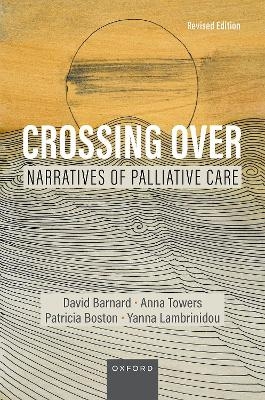
Crossing Over
Oxford University Press Inc (Verlag)
978-0-19-760227-0 (ISBN)
Crossing Over provides a unique view of patients, families, and their caregivers in the face of incurable illness. Twenty richly-detailed narratives bring vividly to life the experiences of dying and bereavement, weaving together emotions, physical symptoms, spiritual concerns, and the stresses of family life, as well as the professional and personal challenges of providing hospice and palliative care. Drawing on a variety of qualitative research methods, including participant-observation, interviews, and journal keeping, the narratives depict the sights, sounds, tastes, and smells of daily life in patients' homes and in the palliative care unit. Crossing Over moves far beyond conventional case reports in medicine, which typically concentrate narrowly on symptoms and treatments, and beyond clichés about "dying with dignity." It provides intimate views of the anger and fear, tenderness and reconciliation, jealousy and love, unexpected courage and unshakable faith, social support and "falling through the cracks," which are all part of facing death in North American society. It provides an extraordinary portrait of the processes of giving and receiving hospice and palliative care in the real world, as opposed to idealized versions in many textbooks.
This edition of Crossing Over has been thoroughly revised and updated to reflect changes in hospice and palliative care and in North American society since the first edition in 2000. Chief among these are the expansion of hospice and palliative care as a field, the ravages of the COVID-19 pandemic, the wider availability of medical aid in dying, and a heightened awareness of how structural racism, classism, and other forms of discrimination shape individuals' and families' experiences right up to the close of life.
David Barnard is an internationally recognized authority on the integration of the humanities in medical education and the humanistic aspects of end-of-life care. He retired as Professor of Medicine and Law at the University of Pittsburgh, the founding Director of the University of Pittsburgh Institute to Enhance Palliative Care, and Director of the Global Health and Human Rights Track at the School of Law. Previously, he was University Professor of Humanities and Chairman of the Department of Humanities at the Pennsylvania State University College of Medicine, the first Department of Humanities ever established at any medical school. Anna Towers is Associate Professor in the Departments of Oncology and Family Medicine, McGill University, Montreal, and a palliative care physician at the McGill University Health Centre. She was Director of Palliative Care McGill from 1999-2009. In this position she helped create the first accredited residency in Palliative Medicine for Canada. She was Chair of the biennial International Congress on Palliative Care from 2004 to 2014. Her academic interests include ethical issues in palliative care, and, more recently, cancer-related lymphedema, an area in which she has received international recognition. Patricia Boston is currently a clinical professor in The Department of Family Practice at The University of British Columbia. She was Director of the UBC Division of Palliative Care between 2003 - 2012 prior to which she was Associate Director of The McGill Programs in Whole Person Care. Patricia's research and teaching interests include: palliative care, grief and bereavement, psycho-social nursing issues and qualitative research methodologies. Yanna Lambrinidou is a medical ethnographer, environmental justice activist, and affiliate faculty in the Department of Science, Technology, and Society at Virginia Tech. She served as the Smith College Lucille Geier Lakes Writer-in-Residence and the EPA National Drinking Water Advisory Council (NDWAC) Lead and Copper Rule (LCR) workgroup. She advised former Michigan Governor Rick Snyder's Flint Water Interagency Coordinating Committee (FWICC) and testified at the US House Democratic Steering and Policy Committee hearing on the Flint water crisis. Her ethnographic teaching module "Learning to Listen" was distinguished by the National Academy of Engineering (NAE) as an exemplary engineering ethics program.
Contents
1. Prelude: Palliative Care in the Time of Pandemic-"
15. Richard Johnson: "Do Not Go Gentle Into That Good Night"
16. Jenny Doyle:
| Erscheinungsdatum | 14.11.2022 |
|---|---|
| Verlagsort | New York |
| Sprache | englisch |
| Maße | 157 x 236 mm |
| Gewicht | 685 g |
| Themenwelt | Sachbuch/Ratgeber ► Gesundheit / Leben / Psychologie |
| Medizin / Pharmazie ► Medizinische Fachgebiete ► Geriatrie | |
| Medizin / Pharmazie ► Medizinische Fachgebiete ► Palliativmedizin | |
| Medizin / Pharmazie ► Pflege ► Palliativpflege / Sterbebegleitung | |
| ISBN-10 | 0-19-760227-4 / 0197602274 |
| ISBN-13 | 978-0-19-760227-0 / 9780197602270 |
| Zustand | Neuware |
| Haben Sie eine Frage zum Produkt? |
aus dem Bereich


